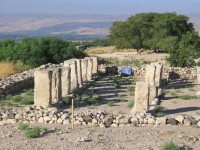By Creation Moments One of the common arguments used by skeptics against the biblical account of the Flood claims that Noah’s Ark could not possibly have accommodated all the millions of species of animals. read more …read more Read more here: Creation Moments
By Multimedia On this episode of ID the Future, Casey Luskin addresses the question: Is intelligent design science? While the precise definition of “science” has long been debated, most would agree that there are certain qualities that clearly define some ideas as science. Luskin examines the theory of intelligent design by this criteria, showing how ID uses the scientific method, undergoes peer review, and does not require non-natural causes. Your browser does not support playing Audio, please upgrade your browser or find our podcast on podOmatic Download Episode …read more Read more here: id the future
By Creation Moments While most would agree that our circulatory system is vital to life, many of us don’t fully appreciate the almost miraculous workings of that system. read more …read more Read more here: Creation Moments
By Tessa Rath On this episode of ID the Future, Casey Luskin continues his conversation with hip hop artist Je’kob about his new album, which includes songs that express his take on intelligent design. Casey asks Je’kob some thoughtful questions about his experiences discussing and articulating intelligent design, how his views have effected his career, and more. Listen in! “This Side of the Sky” is now available! Purchase it at Amazon or iTunes. Also, be sure to check out Je’kob’s single “I Believe” on YouTube. Your browser does not support playing Audio, please upgrade your browser or find our …read [More]
By Discovery Institute On this episode of ID the Future, Casey Luskin talks with up-and-coming hip hop artist Je’kob about his new album “This Side of the Sky,” which includes some tracks that discuss intelligent design. Je’kob gives his perspective on purpose and design in the universe, reflecting on why he was inspired to include intelligent design themes in his music. This Side of the Sky will be released tomorrow, October 7! Purchase it at Amazon or iTunes. Also, be sure to check out Je’kob’s single “I Believe” on YouTube Your browser does not support playing Audio, please upgrade …read [More]
By Creation Moments The lowly earthworm is one of the most under-appreciated little creatures on Earth. People probably don’t appreciate the earthworm because it’s not very pretty. Biology textbooks say that the earthworms were among the first simple land creatures to evolve. Well, clearly there hasn’t been much evolution since, and they are not that simple. The earthworm has a well-developed nervous system, a brain and ten hearts! read more …read more Read more here: Creation Moments
By Multimedia On this episode of ID the Future, Dr. Dominic Halsmer, Dean of the College of Science and Engineering at Oral Roberts University, discusses his recent peer-reviewed paper, “The Coherence Of An Engineered World,” published in the International Journal of Design & Nature and Ecodynamics. Listen in as Dr. Halsmer explains to Casey Luskin why the universe is bio-friendly and the signs of engineering he sees in nature. Your browser does not support playing Audio, please upgrade your browser or find our podcast on podOmatic Download Episode …read more Read more here: id the future
By Creation Moments Hydraulics are part of our everyday lives. Fluids – such as the brake fluid used in your car – cannot be compressed, so when you step on the brake pedal that fluid can be forced from a cylinder into the braking mechanisms attached to your wheels. All hydraulic machines work in a similar way because the fluid used will flow easily to areas where there is less pressure. read more …read more Read more here: Creation Moments
By Andrew McDiarmid On this episode of ID the Future listen as Dr. William Dembski reflects on the origins of his thinking on intelligent design, acknowledging the influence of Richard Dawkins, who gave him the link between specification and complexity as a marker for ID. Order your copy of Being as Communion at a dramatic discount–only $25.95 plus shipping–at www.beingascommunion.com. Your browser does not support playing Audio, please upgrade your browser or find our podcast on podOmatic Download Episode …read more Read more here: id the future
By Creation Moments Modern criticism of the Bible began in the late 1700s and has continued to this day. The usual claim, often from Bible scholars, has been that the Bible is nothing more than error-filled human writings. Before serious excavation work had begun in the mid-1800s, scholars felt free to consider lack of evidence as proof that people, cities, and even whole nations mentioned in the Bible never existed. read more …read more Read more here: Creation Moments
By Discovery Institute On this episode of ID the Future, Casey Luskin talks with Dr. Ann Gauger about her criticisms of the PBS video, “There Was No First Human,” that attempts to show how evolutionary change happens. The video makes the claim that evolution has been a continuous and gradual process–a claim that many evolutionary biologists would disagree with, and that is not supported by evidence from the fossil record. Listen in as Dr. Gauger explains. Your browser does not support playing Audio, please upgrade your browser or find our podcast on podOmatic Download Episode …read more Read more here: [More]
By Multimedia On this episode of ID the Future, Casey Luskin takes a keen-eyed look at Darwin’s tree of life and finds that common descent, far from being confirmed by the data, is actually contradicted by it, as New Scientist pointed out in their cover story, “Why Darwin was wrong about the tree of life.” Listen in to learn how the data is challenging Darwinist assumptions, and check out “A Primer on the Tree of Life” for more information. Your browser does not support playing Audio, please upgrade your browser or find our podcast on podOmatic Download Episode …read more [More]
By Multimedia On this episode of ID the Future, Dr. Dominic Halsmer, Dean of the College of Science and Engineering at Oral Roberts University, continues the discussion of his peer-reviewed paper, “The Coherence Of An Engineered World,” published in the International Journal of Design & Nature and Ecodynamics. Listen in as Dr. Halsmer explains some of the aesthetic arguments for design from beauty in science, engineering, and the study of humanity. How do modularity, specificity, adaptability, durability, and other aspects of engineering systems argue for intelligent design in nature? Tune in to find out. Your browser does not support playing [More]
By Multimedia On this episode of ID the Future, Casey Luskin sits down with Dr. Paul Nelson to hear his take on a recent NYT op-ed authored by University of Washington Professor David Barash. In his article, Prof. Barash explains “The Talk” he gives to his students, in which he insists that science and religion are incompatible. How should students respond to professors that attack their worldviews, and claim to be backed by science? Dr. Nelson gives some advice. Your browser does not support playing Audio, please upgrade your browser or find our podcast on podOmatic Download Episode …read more [More]
By Multimedia On this episode of ID The Future, Biologic Institute’s Dr. Richard Sternberg explains what a gene is, how it works and how our understanding of genes and DNA has changed over the years. He also discusses the growing number of discoveries that are overturning the notion of junk DNA. Your browser does not support playing Audio, please upgrade your browser or find our podcast on podOmatic Download Episode …read more Read more here: id the future
By Creation Moments Whether you know it or not, you are the proud owner of the most complex arrangement of matter in the universe. I am speaking of your brain. Even though it weighs only three pounds, the brain’s structure is so complex that it defies all explanation except to admit that a higher intelligence created it. read more …read more Read more here: Creation Moments
By radio@answersingenesis.org (Steve Ham) …read more Read more here: Answers Conversation
By Creation Moments Many of the leaders of the creationist movement today were once evolutionists. Most of them believed that God created but that He used evolution to do it; this is called “theistic evolution.” read more …read more Read more here: Creation Moments
By Creation Moments Dr. David Menton is a biologist who believes that God created the heavens and the Earth in six days only some six thousand years ago. As he likes to point out, he is a biologist who evolutionists say cannot exist – a biologist who rejects evolution. read more …read more Read more here: Creation Moments
By Creation Moments The air we breathe has always been filled with dust particles. And whether it is dust blown off the ground, smoke particles, or tiny particles of fabric or even paper in the house, these particles find their way deep into our lungs. read more …read more Read more here: Creation Moments
By Creation Moments For thousands of years, man has applied a huge variety of things to his skin to help injuries heal. By trial and error he has come up with ointments that keep injured skin moist to assist the natural healing process. Antibiotics were eventually added to these ointments. But until recently no one has been able to actually increase the rate at which skin naturally heals. read more …read more Read more here: Creation Moments
By Creation Moments Parents today are under a lot of pressure to be more “permissive” and less “authoritative” in raising their children. Research has now shown the results of this progressive thinking. read more …read more Read more here: Creation Moments
Listen Now. part 1 On this episode of ID the Future, Senior Fellow Dr. David Berlinski and Casey Luskin discuss Steven Pinker’s argument from his recent book The Better Angels of Our Nature that human nature is improving. Tune in to this first segment as Dr. Berlinski examines statistical evidence used in support of Pinker’s argument and explains why he has doubts about Pinker’s claim that violence is on the decline.
By Creation Moments In the fall the plants and trees of much of the Earth’s northern hemisphere prepare for winter. Flowers lose their petals, and the leaves fall from trees as the air begins to become cooler. But there is far more to this change in the plants than simply a response to lower temperatures. read more …read more Read more here: Creation Moments
By radio@answersingenesis.org (Steve Ham) …read more Read more here: Answers Conversation
By Creation Moments The familiar little insect known as the water boatman is a marvel of engineering design. About an inch long, it swims on its back on the surface of the pond using two of its legs that are extra long and have little paddles on the end, just like the oars of a boat. Anyone who has tried swimming on his back knows how difficult it is to see where he is going, but not the water boatman. read more …read more Read more here: Creation Moments
By Creation Moments Did you know that some fish actually go fishing? Yes, the female anglerfish lives deep down where it is cold and dark, and it has a six-inch-long fishing pole fixed to its top lip with a little orange light on the end. When the angler is not fishing, the rod fits into a groove on the top of its head. read more …read more Read more here: Creation Moments






















